Your fragrance notes evaporate quickly when they contain lightweight molecules with low molecular weights (under 150 g/mol). Higher temperatures, good airflow, and humidity will speed up this process even more. You'll notice this especially with citrus and light floral scents, which typically fade within 5-15 minutes after application. Understanding how environmental factors influence evaporation can help you make your fragrances last longer.
The Science Behind Top Note Volatility
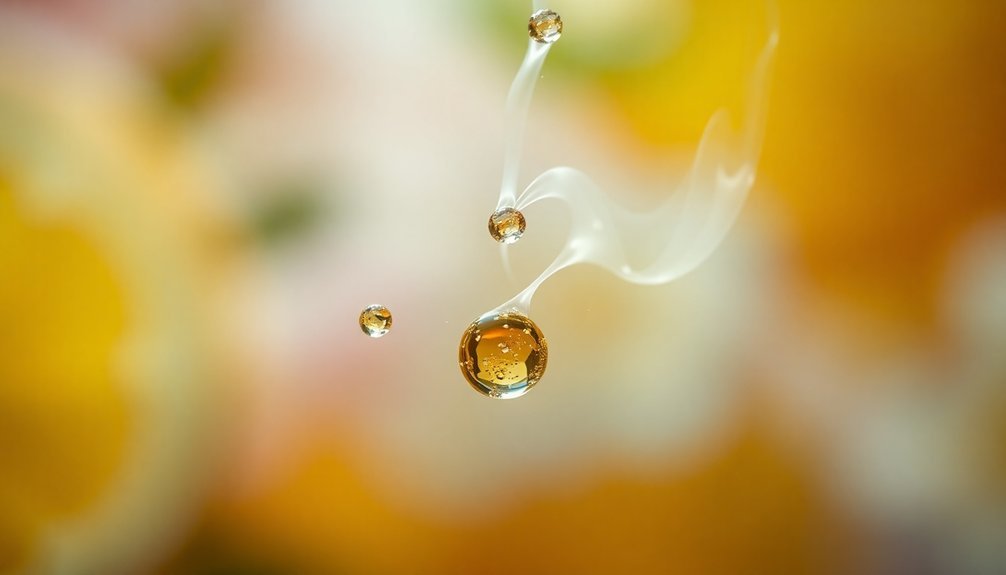
When you first apply a fragrance, it's the top notes you'll notice immediately. These volatile compounds consist of lightweight molecules that create your initial fragrance experience. The evaporation rate of top notes is driven by their low molecular weight, causing them to disperse quickly into the air within five to fifteen minutes.
You'll often find citrus oils like lemon and orange among these top notes, as they're highly volatile and provide that instant invigorating burst.
Airflow greatly impacts how quickly these notes dissipate – the more air movement, the faster the fragrance molecules escape. As these lighter notes fade, you'll experience the shift from top to middle notes, which helps maintain the fragrance longevity and creates a balanced scent progression throughout wear.
Molecular Weight and Evaporation Speed
The relationship between molecular weight and evaporation speed lies at the heart of how fragrances develop on your skin. The molecular structure of fragrance molecules directly impacts how quickly they'll evaporate, creating your unique scent profile over time. The lighter the molecule, the faster it'll disappear into the air.
- Top notes include compounds with lower molecular weights (under 150 g/mol), which evaporate quickly and are more volatile.
- As molecular weights increase, intermolecular forces become stronger, causing molecules to stick together and evaporate more slowly.
- A successful fragrance composition balances molecules of different weights to create a scent that unfolds gradually.
You'll notice this evolution as your fragrance transforms throughout the day, with lighter notes fading first while heavier molecules linger longer.
Environmental Factors Affecting Scent Dispersion
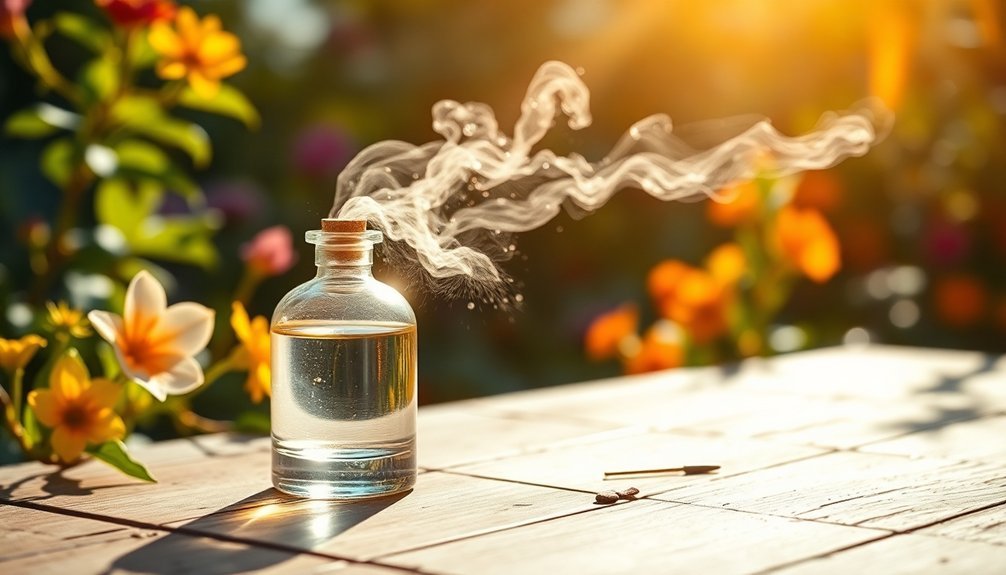
Understanding how your fragrance performs requires careful consideration of environmental conditions that greatly impact scent dispersion.
Humidity levels play a significant role, as higher moisture content accelerates the release of volatile compounds into the air. When you're exposed to extreme temperatures, they'll alter the molecular structure of fragrance notes, causing faster evaporation and potential degradation of your scent.
Your fragrance's longevity is also affected by light exposure and air contact, which trigger oxidation and compromise the scent's integrity.
To maximize your fragrance experience, be mindful of where you apply it – pulse points naturally enhance evaporation rates due to higher skin temperature.
These factors work together to influence how quickly your fragrance disperses, so you'll want to adjust your application method based on environmental conditions.
Temperature and Air Flow Impact
Since temperature and airflow work in tandem, they'll greatly influence how your fragrance molecules disperse into the surrounding environment.
When you're in warm conditions with good airflow, you'll notice your perfume evaporates more quickly due to increased molecular movement and enhanced diffusion.
Here's how these factors affect your fragrance's performance:
- Higher temperature increases the kinetic energy of fragrance molecules, making them more volatile and prone to evaporation.
- Ideal airflow at 0.5 m/s helps sweep away lingering scent molecules, preventing saturation and promoting better dispersion.
- Higher velocities up to 10 m/s combined with humidity can considerably accelerate the evaporation process.
Understanding these dynamics will help you make better choices about when and where to apply your fragrances for ideal performance.
Measuring Top Note Duration
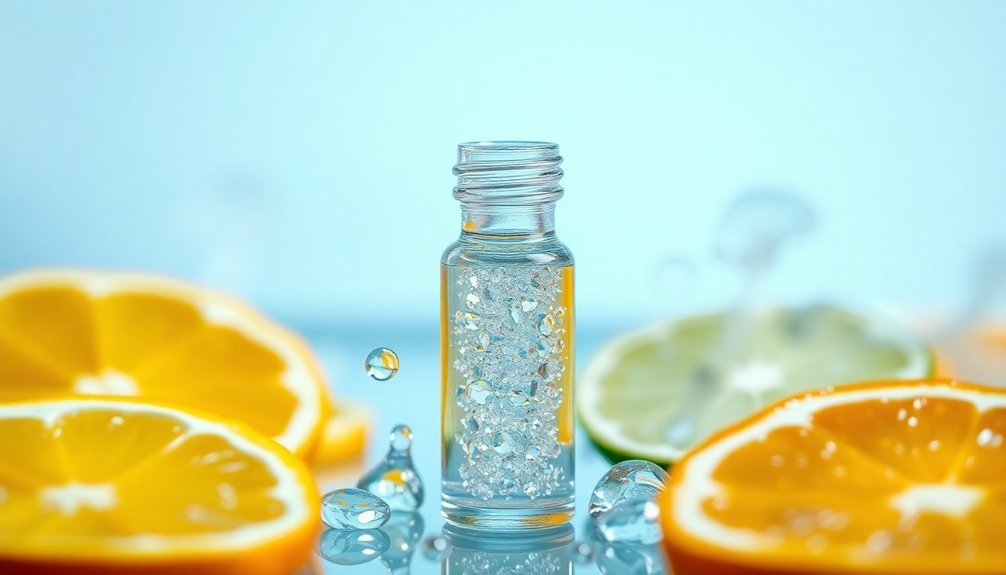
While fragrance enthusiasts often focus on a perfume's overall longevity, measuring top note duration requires specific attention to the first fifteen minutes after application.
You'll notice that different ingredients evaporate at different rates, with citrus and light florals typically being the first to fade. These common top notes include fresh, bright scents that provide the initial burst of fragrance you experience.
The volatility of these notes is directly linked to their molecular weight, with lighter molecules dispersing more quickly into the air.
While middle and base notes last longer than top notes, you can extend the life of top notes by choosing fragrances with higher concentrations of essential oils.
Remember that environmental conditions like heat and humidity will greatly impact how quickly these delicate top notes dissipate.
Frequently Asked Questions
Why Does My Perfume Evaporate so Fast?
Your perfume evaporates quickly because it's made of volatile molecules that easily turn into vapor. Heat, humidity, and your application method can speed up this process on your skin.
Why Does My Perfume Smell Disappear Quickly?
Your perfume's scent fades quickly due to heat, humidity, and dry skin accelerating evaporation. The volatile compounds, especially top notes, dissipate rapidly when exposed to air and environmental factors.
What Note Makes a Perfume Powdery?
You'll find that iris (orris root) is the main note creating that powdery effect in perfumes. Violet, heliotrope, and vanilla also contribute to this soft, comforting sensation. They're often combined with musks.
How to Stop Fragrances From Evaporating?
Apply fragrance on moisturized skin, store it in a cool dark place, avoid humid environments, choose perfumes with high oil concentration, and layer matching scented products for longer-lasting fragrance on your skin.
In Summary
You'll find that fragrance notes evaporate quickly based on their molecular weight, with lighter molecules dissipating first. The warmer your environment and the more air circulation present, the faster your scent will disperse. Understanding these factors lets you make better choices when selecting fragrances, helping you predict how long your top notes will last and when middle notes will emerge.
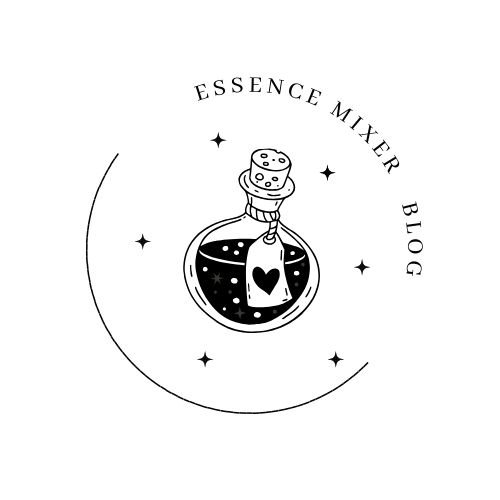
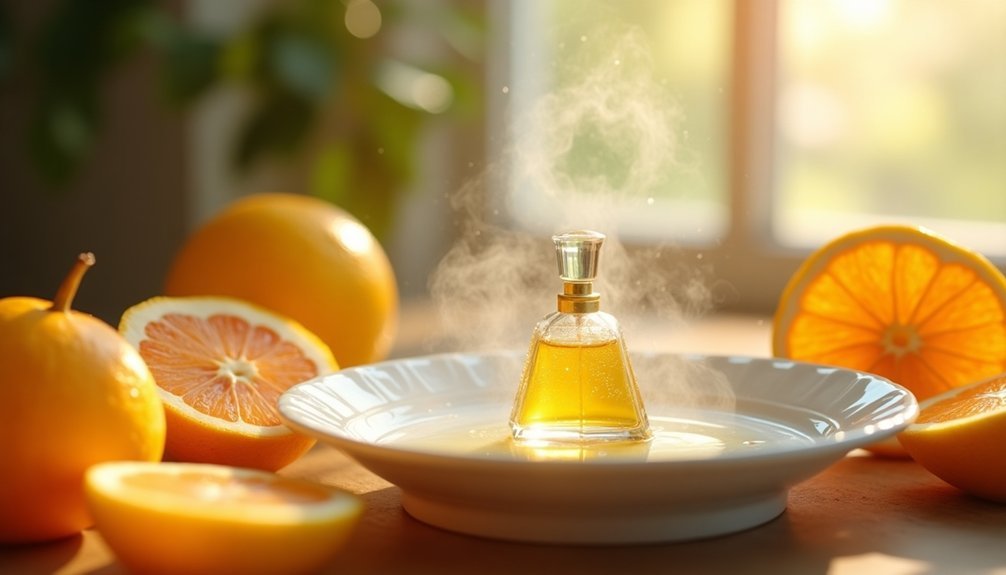



Leave a Reply